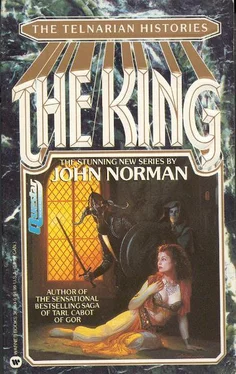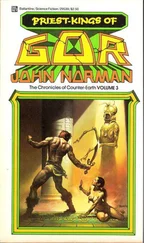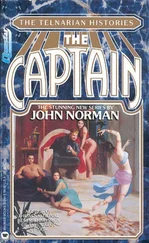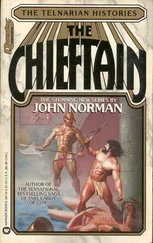“No!” cried one of the liegemen, raising his hand.
“Strike!” cried Valdemar.
The sword was poised.
The liegemen cast their weapons to the floor of the hall.
“Strike!” screamed Valdemar.
But the giant stepped back from the body, through the coals, ascending the far side of the pit.
Valdemar’s liegemen drew him swiftly from the coals, covering his own body with theirs, to smother flames.
Two other bodies were drawn, too, slashed, half dismembered, from the coals, one leg hanging by a muscle to a trunk, furs blackened, and, at the sides, burned away.
A grayish smoke, like haze, hung over the coals.
There was an ugly, sweet odor of burned flesh, of skin, of muscle and fat, in the hall.
The left side of Valdemar’s face was gone, burned away.
The giant came about the pit, and stood over Valdemar, looking down at him.
Valdemar’s men drew back.
Valdemar looked up, unblinking, staring, his right eyelid burned away.
“You are Otung,” he whispered.
“I do not know,” said the giant.
The giant wiped on his furred thigh the long blade.
“Aii!” cried a man.
Too, at the same time, the slave had screamed, but the giant had already slipped to the side.
The blow of Rolof’s sword rang on the thick iron spit, it lying on its rack.
Sparks sprang upward.
“A felon’s stroke!” cried a man.
“Pig!” cried another.
The giant rolled beneath the spit, the long blade lost, and another blow struck down, again ringing, showering sparks, from the spit.
“No longer are you first among the Gri!” cried an angered retainer.
Rolof snarled, and put his foot on the blade of the great sword, holding his own blade ready.
“Pig!” cried a man.
The noble of the Gri was flanked by two cohorts.
The giant now crouched behind the heavy iron spit, it on its rack, a foot above the ground, its metal now twice scarred from the blade of Rolof.
Before him was the noble, and his two fellows, and three blades.
He did not take his eyes from the steel. The giant’s eyes were terrible. From his throat there came a rumbling, growling noise.
“Sheath your weapon!” called Urta to Rolof.
“I sheath my weapon for no man,” said Rolof. “I am king!”
The huge hands of the giant felt for, and closed upon, the long, thick, weighty, still-warm spit on its rack.
Before him were Rolof, and two of the Gri, behind him, glowing, bright with heat, deep with coals, was the fire pit. Its heat was fierce upon his back and legs.
The hands of the giant were upon the spit. The spit had held the weight, unbending, of the great boar, which, ungutted, had weighed better than four hundred pounds. Two men had turned the spit in its mounts. Rolof raised his sword.
With a cry of rage the giant rose up. The spit, like a snake, striking, was not even lifted from the rack, but shattered free, bursting, scattering wood.
The man to the giant’s right had no time even to scream, for the spit, a yard from its end, caught him beneath the left ear, breaking the neck, half tearing the head from the body. Rolof and his fellow were struck to the side by the same blow, and fell, rolling, to the floor. The giant kicked aside the remnants of the rack. Rolof scrambled back. The man to the giant’s left was struck on the return of the spit, and his arm, the elbow smashed, running with blood, hung like rope to the side. He put up his left hand to fend the next blow, but the crook in the spit’s handle, tearing back through the fingers, struck him in the throat, crushing it back, breaking cartilage, inches. Rolof reached for his lost blade. The giant lifted and plunged the portion of the spit handle, two feet long, parallel to its shaft, down twice, once through the jaw and mouth of the man, then on his back, breaking teeth and bone, and driving through tissue, and, then, more carefully, through the forehead, until it stopped, inches deep, in the dirt floor of the hall. Rolof now had his sword in hand but backed away from the giant, who was now regarding him eagerly, terribly, who now held the huge spit, drawn free, its length well beyond the reach of even the great blade, holding it as one might have held the peasant’s weapon, one hand at the center, the other below, the long staff.
Suddenly Rolof cried out, flung down his weapon, and fled toward the entrance of the hall.
The giant pursued him, in fury, the spit, its pointed end forward, lifted over his head in both hands.
Rolof fled up the stairs, toward the wooden door of the hall.
But of course the two beams, barring the door, the hall having been entered, were now in place, secure in their brackets.
Rolof turned about, suddenly, wildly, at the door, knowing he had no time to lift the two beams from the braces.
He stood there, for a moment, on the level before the door, his back to the door.
“No!” he cried.
“Aii!” cried men.
Women screamed.
The giant worked the spit free of the door, through which the point had penetrated, emerging on the other side, and then he carried the spit, on which the body of Rolof was impaled down the stairs, and to the side of the fire pit.
The hall was silent.
He stood near the fire pit, the spit still in the body of Rolof, who, toward the lower end of the spit, had slipped toward its point, and lay on the floor, near the coals, one side of the body illuminated by their light.
One of the liegemen of the Tiri looked up, from his knees, where he knelt beside a seared body.
“Lord Valdemar is dead,” said the man.
“He died as first among the Tiri,” said another.
“Yes,” said another.
The giant, with his foot, thrust the body of Rolof from the spit, and cast the spit aside.
He then, from near the fire pit, retrieved the great sword.
He then looked about the hall, from face to face, Ulrich, Gundar, Hartnar, Gelerich, Astarax, the others.
He then turned to face Urta, the King Namer.
“Who is king?” asked the giant.
“You are king,” said Urta.
“Let us eat,” said the giant. “I am hungry.”
There is little more to tell, at this time, though, in a sense, this was the beginning, not that it was then recognized as such.
On a winter night, after feasting, the giant, outside the hall, in the snow, for such things are done outside, in the light of a sun, or of stars, was lifted upon the shields of Otungs.
His nature, and his lineage, no more than his destiny, were at that time unknown.
He refused to sit upon the empty throne, that upon the dais in the hall, as he had not yet, at that time, in his view, earned such a right. Too, the medallion and chain, which was the token of an Otung king’s office, his heritage and right, was not with the Otungs. It was that on which the heads of clans, long ago, had sworn the honoring of the kingship, even before the time of Genserix. Until that was found there was little assurance, and even less hope, that the nobles of the Otungen would long respect the kingship, such being the force of ambition amongst them.
Fuldan, the Old, who had been sought, that he might look upon the stranger, and speak upon his appearance, which had so intrigued some members of the hall, was not found in his hut, for he had, in desolation and grief, in sorrow for the debasement of the Otungen, even before the time of the king naming, left the forest, borne upon a litter, in furs, his bones ancient with pain, and misery, with ten retainers.
“They are no longer the folk, no longer the Otungen,” he had said.
He did not know then, mercifully enough, one supposes, of the election of a stranger as king, which matter might have caused him even greater pain.
Читать дальше












